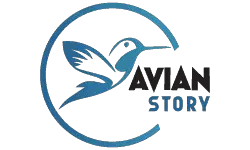Can Budgies Eat Cauliflower? What Is the Best Way to Feed Them for Maximal Benefits?
Cauliflower is a cruciferous vegetable best known for its naturally high fiber content. It also has several healthy nutrients that humans and animals require in their diet. However, is this vegetable safe for your pet budgie?
So, can budgies eat cauliflower? Yes, budgies can eat this vegetable and benefit from its various nutrients. Cauliflower is a good source of dietary fiber your budgie requires to be healthy. Budgies can eat cauliflower raw, but if your budgie has a sensitive stomach, it should eat them cooked.
People confuse cauliflower with broccoli since they look alike and have similar nutritional advantages. Read more for a comprehensive cover on this topic to discern most of your doubts on this vegetable.
Can Pet Budgies Eat Cauliflower?
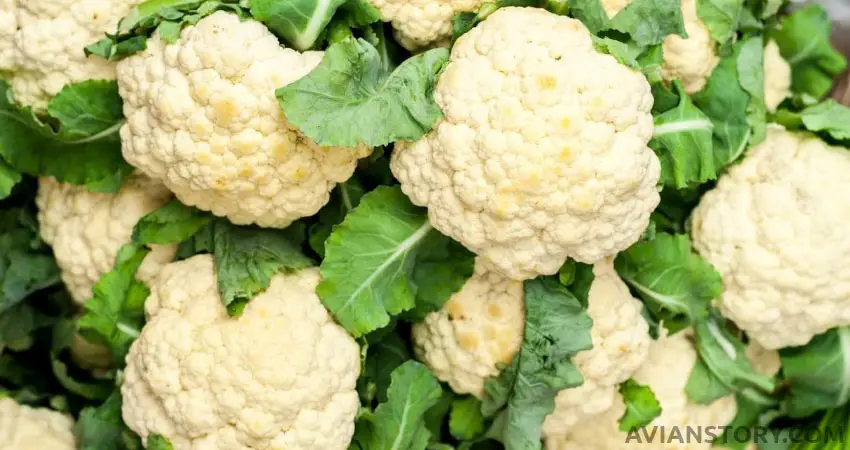
It is perfectly okay for budgies to eat cauliflower. Among the dietary requirements of budgies are vegetables, including spinach, corn, carrots, and cauliflower. Though they are not as popular as their cousin broccoli, cauliflowers can be a great addition to the green diet of these omnivore pets. Budgies enjoy these crunchy vegetables, which can be served with other treats to provide a balanced diet. The high fiber is one of many notable health advantages of this plant.
Which Part of The Cauliflower Should You Feed Your Budgie?
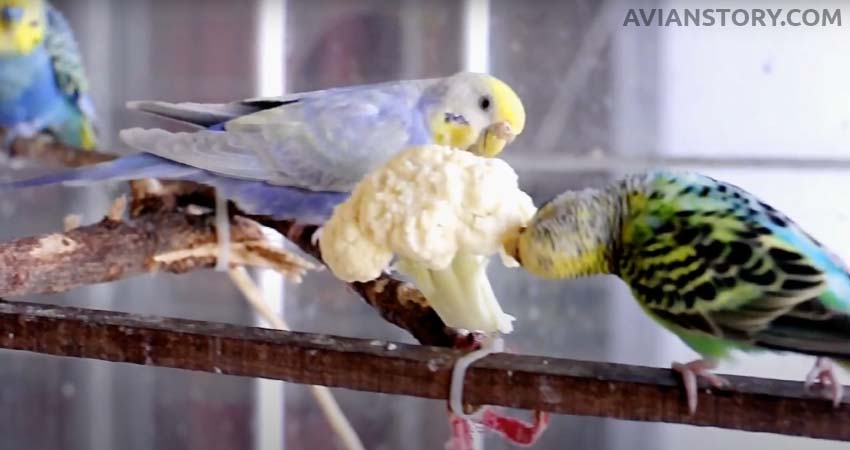
Cauliflower is creamy white succulent flesh called curd, which can also be green, purple, or orange in color. This inner segment is the mainly eaten part of the vegetable, but the leaves are also edible and safe. Cauliflower grows like cabbages and reproduces by seeds planted after harvest. Like broccoli, this vegetable is among the plants in the family Brassicaceae of the oldest cultivated plants known to humans.
Cauliflower was originally grown in Asia and later in Europe from the 1500s. These vegetables grow annually, taking between three and five months to grow, which varies with weather conditions. While mature, the plant can reach up to 1.5 feet (0.5 meters) in length and bears large leaves. The curds can grow to diameters between 6 to 8 inches, after which they are mature enough to be harvested.
These vegetables are widely available in local grocery stores and at fair prices. They are most nutritious when fresh, but given their wide availability, it’s hard to miss a fresh bunch. Cauliflowers are among the nutritious foods you and your pet budgie can enjoy eating together.
Can Budgies Eat Cauliflower Raw?
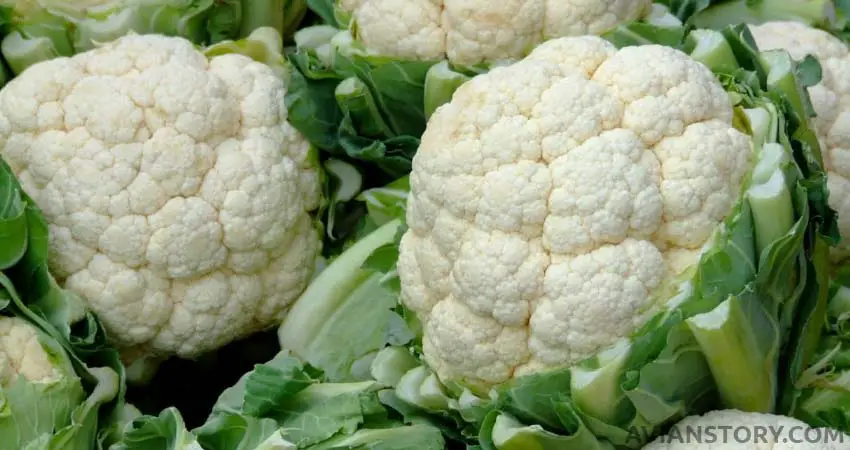
Vegetables are mostly healthier when they are raw compared to after cooking. Cauliflower is among them, and your bird friend can enjoy it when raw, when the plant is wholly nutritious. Budgies also enjoy cauliflower uncooked because of its crunchy and sweet taste. Fresh cauliflower contains 30 percent more proteins and antioxidants than when cooked.
However, this doesn’t rule out the idea of cooking or steaming these vegetables. Cooked cauliflower tastes sweeter than raw, though this is based on human experience rather than the actual birds. To prepare these vegetables by cooking, you shouldn’t use ingredients that can harm your pet budgie’s health.
What Are the Nutritional Benefits of Cauliflower?
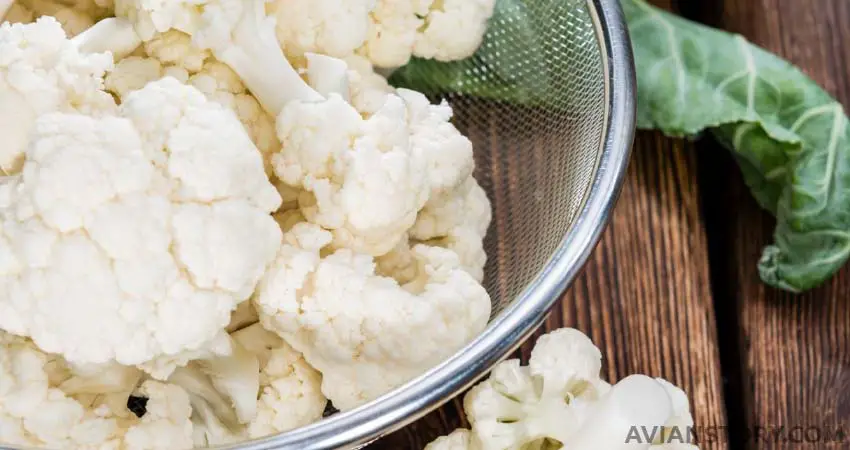
Cauliflower is a high-scoring vegetable in the nutritional department. It contains nutrients, including vitamin C, that supports the Immune system and the development of your budgie’s body tissues. According to Don Burke of world budgerigar organizations, calcium is one of the most critical dietary requirements for budgies. Cauliflower contains calcium, which can aid your bird in the development of stronger bones.
It’s also high in dietary fibers that your pet budgie requires for overall health. Fiber promotes digestive health while preventing constipation and diverticulitis in your budgies. The plant is also suitable for your pets if they are overweight or diabetic because of its low calories. Hopefully, these nutritional advantages are enough to clear your doubts in case you wondered, is cauliflower good for budgies?
How Much Cauliflower Should A Budgie Eat?
Despite having many nutritional benefits, you should control the amount of cauliflower you feed your budgie. Remember, you’re supposed to balance their diet, and cauliflower is not the only fresh vegetable to feed them. The experts advocate for one or two servings of this vegetable weekly. You can cut the cauliflower into two or four pieces, depending on its size and the number of parakeets you have.
How to Prepare Cauliflower for Budgies?
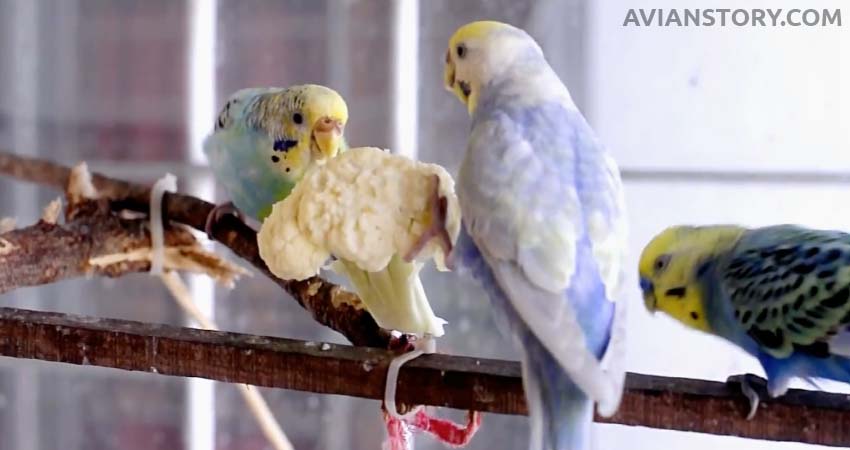
You’re probably wondering how best you should prepare cauliflower for your pet budgies. But, this choice is not based on you alone, but on the budgies as well. So, can budgies eat cooked cauliflower? While some budgies prefer cooked cauliflower, others love them raw. You should try both methods to identify what your budgies love.
If your budgie seems to love this vegetable both raw and cooked, good for you because you can alternate. Proper cleaning is necessary during preparation. We advise running water through the veggie to clean all the dirt. Those crevices in a cauliflower not only store up dirt but are also a breeding site for bacteria.
But, you should only wash the cauliflower when feeding your pet. If you’re feeding them raw, you only need to cut them into sizable pieces that your bird can eat comfortably. When cooking, avoid overdoing it because the cauliflower will lose nutrients in the process. Instead, steam them under moderate heat until soft.
What Are the Possible Health Risks of Cauliflower to Budgies?
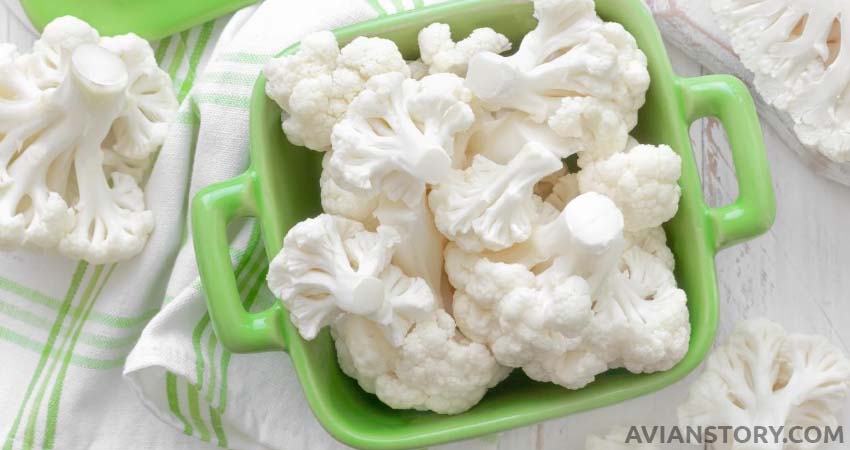
The first risk your pet might be after eating cauliflowers is bloating and indigestion. This is a result of the high fiber, the same carbohydrate that makes the plant highly recommendable. Serve your pet this diet sparingly and infrequently to avoid these possible health complications. Also, give your pet some water after it takes the cauliflower to move these fibers along the system more smoothly.
On the PH scale, cauliflower is slightly acidic, with a PH of around 5.30. However, this is still near the safe level, though in excess, it can cause kidney problems for your bird. Another health risk is the fertilizer used and if it is not organic, your bird might have digestion problems. Always wash fruits and vegetables after buying to get the lid of any germs that might hurt your pet.
Video Of Budgies eating a cauliflower
Below is a thrilling video of happy budgies devouring a cauliflower. You should observe how cheery they all appear.
FAQ
Despite some foods being dimmed safe for pet birds, there are still doubts and an urge to know more. These questions and doubts go deeper and beyond the topic to cover as much information as possible. The following are some of the most frequently asked questions on this topic and their answers.
How Do I Give My Budgie Cauliflower?
Like most pet birds, budgies don’t require much preparation for their food. To give them the cauliflower, pick a few pieces and put them in their feeding bowl. The pets can eat raw and steamed cauliflowers, but they mostly prefer to eat it crunchy and raw.
Are Cauliflower Leaves Safe for Budgies?
Cauliflower leaves are perfectly safe for your pets to consume. To answer the question, can budgies have cauliflower leaves? Note that, like the inner curd, the leaves carry various nutrients your pet can benefit from. Serve this diet along with other foods to provide a variety of nutrients for your pet.
Outro
It’s in the heart of pet lovers to want to share almost every healthy food with their pets. The first step, of course, is to research various health benefits and risks for your pet before serving them. In most cases, the findings are positive, as in the case of the cauliflower plant. Your parakeet will enjoy the benefits as you feel satisfied for treating them well.
The answer to “can budgies eat cauliflower?” is yes, with a few worthy things to note for your pet to benefit fully. Covering this article now puts you in a better position when feeding your pet this healthy plant. If you observe all the things we have addressed, yours will be an ever-thriving friendship.
